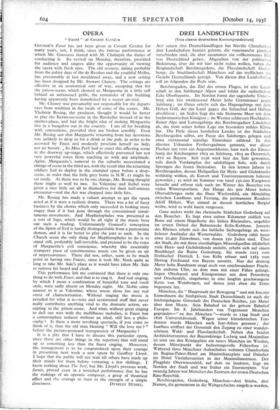OPERA
" Faust " at Covent Garden
GOUNOD'S Faust has not been given at Covent Garden for many years, not, I think, since the famous performance at which Mr. Goossens shared with M. Chaliapin the duties of conducting it. Its revival on Monday, therefore, provided for audience and singers alike the opportunity of viewing the opera with fresh eyes. The old scenery, dating probably from the palmy days of the de Reszkes and the youthful Melba, has presumably at last mouldered away, and a new setting has been designed by Mr. Stewart Chaney. The settings are effective in an economical sort of way, excepting that for the prison-scene, which showed us Marguerite in a little cell behind an unfastened grille, the remainder of the building having apparently been demolished by a recent air-raid.
Mr. Chaney was presumably not responsible for the depart- ures from tradition in the locale of some of the scenes. Mr. Vladimir Rosing, the producer, thought it would be better to play the Kermesse-scene in the Ratskeller instead of in the market-place, and had the bright idea of making Marguerite live in a bungalow out in the country. I am all for breaking with conventions, provided they are broken sensibly. Even Mr. Rosing saw that Marguerite returning from her devotions was unlikely to drop in for a drink at the pub. in order to be accosted by Faust and modestly proclaim herself no lady, nor no beauty. So Miss Perli had to enact this affecting scene in the doorway up-stage, which effectively prevented her not very powerful tones from reaching us with any amplitude. Again, Marguerite's removal to the suburbs necessitated a change of scene in the third act, with the result that the returning soldiers had to deploy in the cramped space before a drop- scene, in order that the little grey home in N.W. 11 might be set ready. As there was to be one change, Mr. Rosing thought there might as well be two. So Valentine and Siebel were given a nice little set all to themselves for their half-minute encounter—and the Act was chopped into little bits.
Mr. Rosing has made a valiant attempt to get the opera acted as if it were a realistic drama. There was a lot of fussy business by the chorus which only succeeded in looking more stagey than if it had gone through the conventional simul- taneous movements. And Mephistopheles was presented as a sort of Iago, which would be all right if the music bore out such a reading. Unfortunately Gounod's conception of the Spirit of Evil is hardly distinguishable from a pantomime demon, and it is far better to play the part as such. In the Church scene the only thing for Mephistopheles to do is to stand still, preferably half-invisible, and pretend to be the voice of Marguerite's evil conscience, whereby this essentially trumpery piece of sanctimonious music can be given an air of impressiveness. There did not, either, seem to be much point in having two Fausts, since it took Mr. Nash quite as long to take Mr. Sale's place as it would have taken Mr. Sale to remove his beard and cloak.
This performance left me convinced that there is only one thing to do with Faust, and that is to sing it. Ancrreal singing, by which I mean a combination of beautiful tone and vocal style, were sadly absent on Monday night. Mr. Noble came nearest to it as Valentine, whose music alone has any real sense of characterisation. Without singing the music is revealed for what it is—trite and sentimental stuff that never really contributes anything vital to the dramatic action, ex- cepting in the prison scene. And what, without great singing to dull our wits with the mellifluous melodies, is Faust but a commonplace seducer without an ideal, still less a philo- sophy ? Is there a more revolting spectacle, if you come to think of it, than the old man bleating " Will she love me ? " before the picture-postcard transparency of Marguerite ?
It is a pity that I have to discuss this particular opera, since there are other things in the repertory that will stand up to something less than the finest singing. Moreover, the management is to be congratulated upon their courage in presenting next week a new opera by Geoffrey Lloyd. I hope that the public will not wait till others have made up their minds for them before venturing a few shillings. I know nothing about The Serf, but Mr. Lloyd's previous work, lernin, proved even in a wretched performance that he has the makings of an operatic composer, a grasp of theatrical effect and the courage to trust to the strength of a simple


















































 Previous page
Previous page